人教英语八年级上册unit 7一般将来时教案
人教版英语八年级上册Unit 7《Will people have robots》教学设计
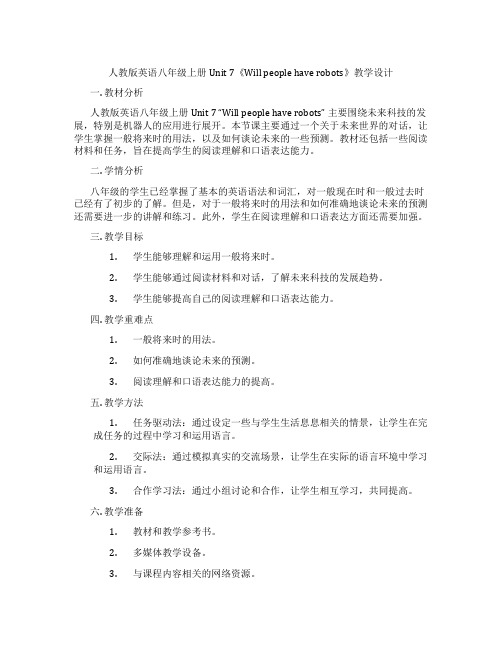
人教版英语八年级上册Unit 7《Will people have robots》教学设计一. 教材分析人教版英语八年级上册Unit 7 “Will people have robots” 主要围绕未来科技的发展,特别是机器人的应用进行展开。
本节课主要通过一个关于未来世界的对话,让学生掌握一般将来时的用法,以及如何谈论未来的一些预测。
教材还包括一些阅读材料和任务,旨在提高学生的阅读理解和口语表达能力。
二. 学情分析八年级的学生已经掌握了基本的英语语法和词汇,对一般现在时和一般过去时已经有了初步的了解。
但是,对于一般将来时的用法和如何准确地谈论未来的预测还需要进一步的讲解和练习。
此外,学生在阅读理解和口语表达方面还需要加强。
三. 教学目标1.学生能够理解和运用一般将来时。
2.学生能够通过阅读材料和对话,了解未来科技的发展趋势。
3.学生能够提高自己的阅读理解和口语表达能力。
四. 教学重难点1.一般将来时的用法。
2.如何准确地谈论未来的预测。
3.阅读理解和口语表达能力的提高。
五. 教学方法1.任务驱动法:通过设定一些与学生生活息息相关的情景,让学生在完成任务的过程中学习和运用语言。
2.交际法:通过模拟真实的交流场景,让学生在实际的语言环境中学习和运用语言。
3.合作学习法:通过小组讨论和合作,让学生相互学习,共同提高。
六. 教学准备1.教材和教学参考书。
2.多媒体教学设备。
3.与课程内容相关的网络资源。
七. 教学过程1.导入(5分钟)通过向学生展示一些机器人的图片,引起学生的兴趣,然后提问:“你们认为未来的人们会拥有机器人吗?”,让学生发表自己的看法。
2.呈现(10分钟)老师通过讲解和示范,向学生介绍一般将来时的用法,并举例说明如何准确地谈论未来的预测。
3.操练(10分钟)学生分组进行角色扮演,模拟真实的交流场景,运用一般将来时进行对话。
老师对学生的表现进行指导和评价。
4.巩固(10分钟)学生阅读教材中的阅读材料,理解并回答相关问题。
英语人教版八年级上册Unit7 Will pe教学设计说课稿

Unit7 Will people have robots? Period one说课稿民乐三中高辉尊敬的评委老师们:大家好!今天我给大家说课的内容是人教版go for it 八年级上册Unit7 Will people have robots? Section A(1a--2c)。
整个说课内容包括八个部分:说教材、说学生、说教学目标、说教学重点和难点、说教学策略、说学法、说教学过程和说教学评价。
一、说教材1.教材的地位及作用本单元是八年级(上)第七单元,涉及的主要话题是预测未来、一般将来时的表达方法。
要求学生学会There will be 句型并用其谈论预测未来。
学生通过语言的学习,掌握will/won’t的用法及一般将来时及其一般疑问句的回答,熟悉There will be的用法。
本课为本单元第一课时,主要涉及到will/won’t用法的引入、操练以及运用一般将来时完成任务,在本单元处于重要的位置。
由于既要复习检查本单元所学内容,又要教授新课,课堂容量较大。
因此,教师在教学中要时刻注重调动学生的兴趣,讲练结合。
新课程的理念之一是“开发课程资源,拓展学用渠道”,这意味着教师可以根据学生的实际情况和需要灵活地处理教材,因此,我对Section A部分的三个听力重点处理了2b,2a匆匆带过,节省下的时间主要用来开展对话活动。
2.教材内容本单元主要是让学生学习能根据对方所提出的问题,结合所学的一般将来时给出一些合理的答语。
通过教师讲解和听力练习以及对话练习后再开展一些对话和小组训练来巩固所学知识。
内容涉及了听、说、读、写四个方面,既有口语对话,也有听力能力训练。
通过学习,学生可以更加熟练掌握一般将来时及其用法。
3.课时分析本节课是本单元的第一课时,也是本单元的重点。
通过学习Will there be...?以及回答,增强他们对具体情境的进一步认识,能够运用所学知识谈论将来、预测将要发生的事并做出回答。
Unit7大单元整体教学设计人教版英语八年级年级上册
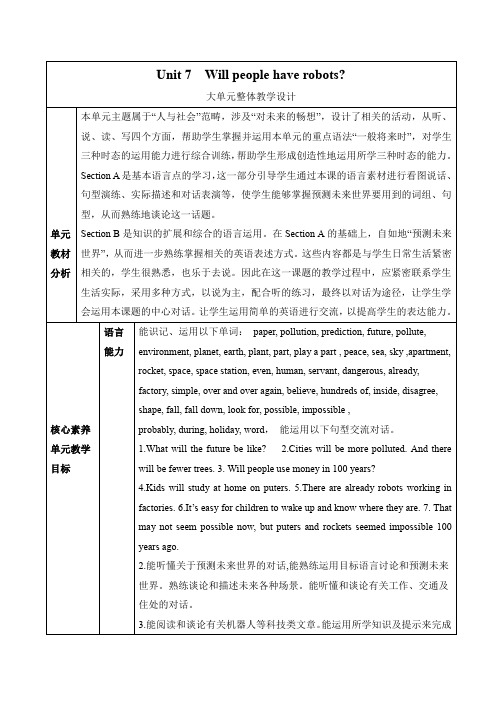
2.难点:(1)掌握more/fewer;more/less的用法。
(2)“will+动词原形”表达一般将来时态。
Period Ⅱ
Section A
(Grammar Focus
~3c)
2.归纳总结一般现在时态的肯定、否定及疑问句式。
1.能够掌握课标要求的词汇。
Section A是基本语言点的学习,这一部分引导学生通过本课的语言素材进行看图说话、句型演练、实际描述和对话表演等,使学生能够掌握预测未来世界要用到的词组、句型,从而熟练地谈论这一话题。
Section B是知识的扩展和综合的语言运用。在Section A的基础上,自如地“预测未来世界”,从而进一步熟练掌握相关的英语表述方式。这些内容都是与学生日常生活紧密相关的,学生很熟悉,也乐于去说。因此在这一课题的教学过程中,应紧密联系学生生活实际,采用多种方式,以说为主,配合听的练习,最终以对话为途径,让学生学会运用本课题的中心对话。让学生运用简单的英语进行交流,以提高学生的表达能力。
PeriodⅤ
Section B
(3a~Self Check)
1.了解Jill对未来的预测。
2.写一篇小作文,谈谈自己对将来的设想。
3.通过小组调查,了解同学们对机器人的了解情况,让同学们画出自己喜欢的机器人形象。
1.能够掌握课标要求的词汇。
2.通过大量练习,进一步巩固和运用一般将来时态。
3.通过阅读短文了解Jill的生活设想,学会表达自己的想法。
3.准确使用一般过去时、一般现在时和一般将来时。
4.阅读短文,获得相关信息,提高综合阅读能力。能运用所学的知识与句型表达方式来描绘一下自己未来的生活。
八年级英语上册-Unit-7-Will-people-have-robots备课教案-(新版)人教新
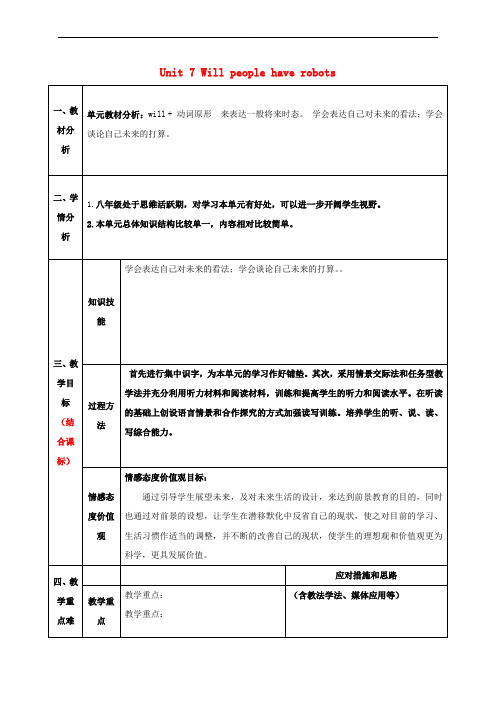
一、教材分析
单元教材分析:will + 动词原形 来表达一般将来时态。 学会表达自己对未来的看法;学会谈论自己未来的打算。
二、学情分析
1.八年级处于思维活跃期,对学习本单元有好处,可以进一步开阔学生视野。
2.本单元总体知识结构比较单一,内容相对比较简单。
教学重点:
教学重点:
1)学习掌握一般将来时态的意义和结构。
2) 掌握There be句型的一般将来时态的结构。
(含教法学法、媒体应用等)
教学难点
教学难点:
掌握more/fewer;more/less的用法。
情态动词will + 动词原形来表达一般将来时态。
(同属教学重难点的,在本栏书写)
五、课时安排
三、教学目标
(结合课标)
知识技能
学会表达自己对未来的看法;学会谈论自己未来的打算。。
过程方法
首先进行集中识字,为本单元的学习作好铺垫。其次,采用情景交际法和任务型教学法并充分利用听力材料和阅读材料,训练和提高学生的听力和阅读水平。在听读的基础上创设语言情景和合作探究的方式加强读写训练。培养学生的听、说、读、写综合能力。
Period 1 Se-2d 听说课
Period 3 Section A Grammar Focus-3c语法课
Period 4 Section B1a-1e 听说课
Period 5 Section B2a-2e 阅读课
Period 6 Section B3a-3c阅读课
Period 7 self check and unit review
六、知识结构
七、其它补充
情感态度价值观
人教版八年级英语上册Unit7教案(表格式三维目标)
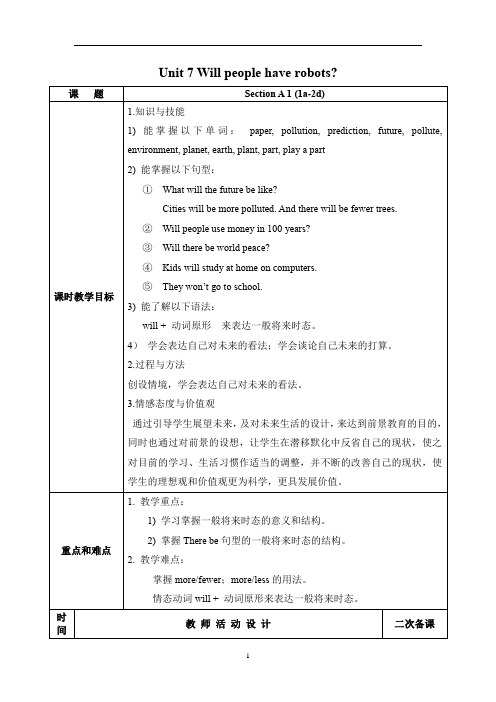
Unit 7 Will people have robots?答语:Yes, there will. / No, there won’t.三、可数名词1. more +不可数名词2. less + 不可数名词3. fewer + 可数名词Ⅳ. PracticeWork on 3a:1. Tell Ss to read the conversation in 3a and try to fill in the blanks withmore/ less or fewer.2. 方法指导:应通读整个对话,掌握对话大意;然后,根据空格后的名词是可数名词还是不可数名词来确定是用more, less 还是fewer。
注意,有些名词前有形容词来修饰。
3. 最后,教师与同学们一起校对答案,并对学生们有疑问的地方进行解释。
4. 学生们阅读这些句子并试着记住这些句子。
Work on 3b:1. 让学生们阅读句子的开头,明白每个句子的意思。
2. 让学生们思考一下针对这一情况,在将来会发生什么样的情况。
3. 让学生们互相检查自己所写的句子,发现并改正错误。
4. 让部分学生说一说自己所写的句子。
大家一起改正句子中的错误。
Ⅴ. Group work1. 小组中的同学们对未来的城市进行讨论。
2. 每个成员发表自己的想法,小组长进行记录,并进行汇总。
3. 最后,同学们根据小组成员的想法,然后,展开想象,试着每名同学们画一幅未来城市的画。
4. 最后,比较一下每个小组的画,看哪个小组画得较好。
5. 试着对自己小组里的情况用英语做成一个报告。
Ⅵ. ExercisesIf time is enough, do some more exercises on big screen.Homework1. 复习Grammar Focus 中的内容。
展开你想象的翅膀,想一下50年后,你的生活将会怎么样?并写六个句子来描述一下。
In fifty years, …教学反思。
人教八年级上册Unit7Willpeoplehaverobots教学设计
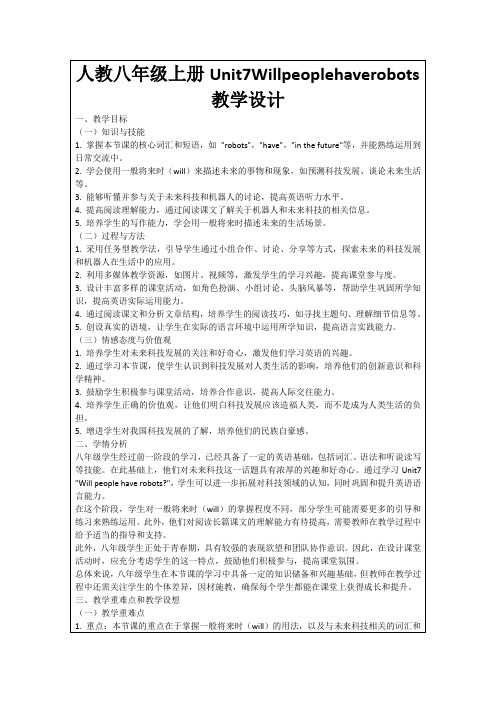
1.教师将学生分成小组,每组讨论以下问题:“Do you think people will have robots in the future? Why or why not?”
2.学生在小组内展开讨论,鼓励每个成员发表自己的观点,并尝试用一般将来时描述未来的场景。
3.各小组汇报讨论成果,教师给予点评和指导,引导学生关注语法和词汇的准确性。
2.提问学生:“What do you think life will be like in the future?”,鼓励学生发挥想象力,用英语分享自己对未来生活的看法。
3.学生分享完毕后,教师总结并引入本节课的话题:“Today, we are going to learn about the future and whether people will have robots.”
(二)讲授新知
1.教师带领学生一起学习本节课的核心词汇和短语,如"robots","have","in the future"等,通过图片、例句等形式帮助学生理解和记忆。
2.接着,教师讲解一般将来时(will)的用法,结合课文中的句子进行示范和讲解。
3.学生跟随教师一起朗读课文,体会一般将来时的用法,并尝试在教师的引导下进行句子创编。
总体来说,八年级学生在本节课的学习中具备一定的知识储备和兴趣基础,但教师在教学过程中还需关注学生的个体差异,因材施教,确保每个学生都能在课堂上获得成长和提升。
三、教学重难点和教学设想
(一)教学重难点
1.重点:本节课的重点在于掌握一般将来时(will)的用法,以及与未来科技相关的词汇和表达方式。
难点:学生对一般将来时的运用可能存在困难,尤其是在口语表达中。此外,对课文长难句的理解和翻译也是学生需要克服的难点。
人教版八年级英语上册 Unit 7 语法课 一般将来时 教案

By the end of the class, the students will be able to…
Linguistic objectives:use the simple future tense“shall/will do”and“be going to do”make sentences and describe something orderly and correctly.
Strategy objectives:catch the key rules of“shall/will do”and“be going to do”
Teaching Focus and the Way Out
Master and learn to use the two components of the simple future tense
Explain the rules of“shall/will do”and“be going to”,do exercise to learn how to use the simple future tense
Teaching Methodology
My teaching philosophy:
A: what are you going to do this Sunday?
B: I am going to….
C: what is she /he going to do this Sunday?
D: she/he is going to do ….
E: what do you do tomorrow?
According to social-constructivist theory, teachers should act as the role of scaffolding for the students. He should not tell the students everything, but encourage and provide support for the students to find things on their own in language teaching. And the teacher only plays the role of "consultant", "facilitator" and "helper". Under the guidance of teachers, students, and the construction of internalized knowledge, development and progress of the students mainly rely on their own, here the subject position of the students is fully displayed, which helps to improve the students' English learning, to cultivate students' comprehensive ability to use the language, intelligence from one level to another new level.
人教版八年级英语上册Unit7Willpeoplehaverobots单元整体教学设计
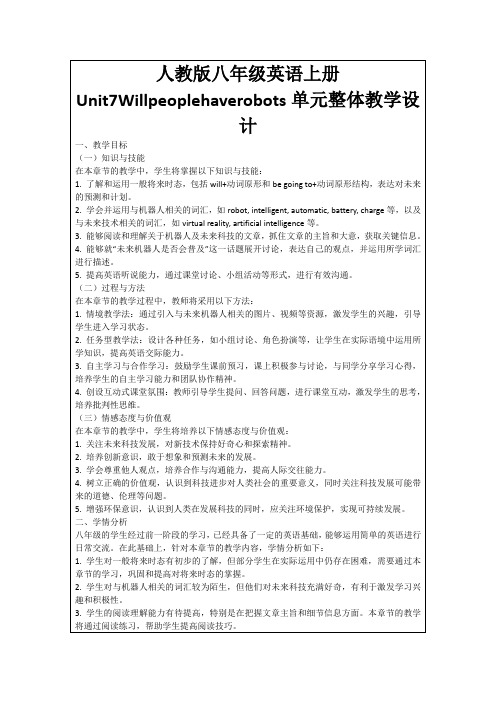
5.研究性学习:分组进行项目研究,选择一个未来科技领域(如虚拟现实、人工智能等)进行深入了解,制作一份PPT,并在下节课进行分享。
6.家庭作业:鼓励学生与家长一起讨论未来机器人的发展,记录下家庭成员的观点和想法,以日记形式进行记录。
2.学生对与机器人相关的词汇较为陌生,但他们对未来科技充满好奇,有利于激发学习兴趣和积极性。
3.学生的阅读理解能力有待提高,特别是在把握文章主旨和细节信息方面。本章节的教学将通过阅读练习,帮助学生提高阅读技巧。
4.学生在表达个人观点方面存在一定的困难,需要教师引导和鼓励,培养他们的思辨能力和口语表达能力。
2.学生讨论:学生分组讨论,分享他们对未来生活的期待和想象。教师巡回指导,鼓励学生用英语表达自己的观点。
3.导入语:After discussing the future life, let's learn about the topic of Unit 7: Will people have robots? In this unit, we will talk about the development of robots and the possible changes they will bring to our lives.(讨论完未来生活后,我们来学习第七单元的主题:人们会有机器人吗?在本单元,我们将讨论机器人的发展以及它们可能给我们的生活带来的变化。)
2.任务型教学法:设计各种任务,如小组讨论、角色扮演等,让学生在实际语境中运用所学知识,提高英语交际能力。
3.自主学习与合作学习:鼓励学生课前预习,课上积极参与讨论,与同学分享学习心得,培养学生的自主学习能力和团队协作精神。
人教版八年级上册英语第七单元Unit7教案
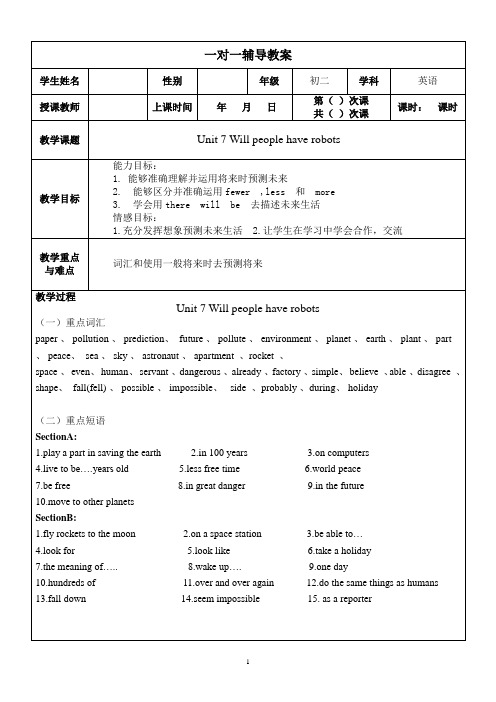
用将来时.I can finish the work in two days.我两天之内能完成这项工作。
She will graduate in two years.她两年后毕业。
2)after指以过去时间为起点的“在一段时间以后”,所以与过去时态连用。
当after指某个特定的未来时刻或日期之后,或指一将来某一时间为起点的若干时间之后时,他可以与将来时态连用。
Eg.He started on Sunday and arrived in Beijing after three days.他周日启程三天后抵达的北京。
I’ll be back after three o’clock.他三点之后回来。
4.There will be fewer people.会有较少的人There will be less free time. 较少的空闲时间There will be more pollution.更多的污染fewer 是few 比较级,其后接名词复数。
“较少的,少量的”与less 是同义。
I have fewer friends in my class.在我们班我有较少的朋友。
less 是little 的比较级,其后接不可数名词。
“较少的,少量的”more 是many 和much 的比较级即可跟不可数名词也可跟复数名词。
“更多”He has more money and more friends 他有更多的钱和更多的朋友。
There will be less pollution in the future.将来会有较少的污染。
5.(be)in great danger.处于极度危险中。
They are in great danger .他们处于极度危险中We should save animals in danger. 我们应该拯救处于危险中的动物。
6.There are already robots working in factories. There be+n. +v.ing .某地有某人正在做某事There are many girls singing in the room . 有许多女孩正在房间里唱歌。
人教新目标八年级英语上册教案Unit7Willpeopleha

精品基础教育教学资料,请参考使用,祝你取得好成绩!Unit 7 Will people have robots?【学习目标】1.Words and expressions2.Revise will 构成的一般将来时态的陈述句、否定句、疑问句及回答3.对自己的未来充满希望,做一个有理想的人课标要求:1.Revise words and expressions2.Revise will 构成的一般将来时态目标达成:加深巩固重点知识的用法。
学习流程:【课前展示】掌握本课重点单词和短语.我自己(反身代词)____面试(名词)____ 公司____预言(动词)____ 预言(名词)____come过去式____ think过去式____声音____ 未来,将来____【创境激趣】还记得学过的词汇吗?1. He will f from New York to London tomorrow.2. Yang Liwei is the first a____________ in China.3. One day p eople may f ly r_____________ to the moon for vacations.4. I f________ in love with the weather here last year.5. In autumn, the leaves f to the ground.6. He lives a in the large house, but he do esn’t feel lonely. 【自学导航】完成self check1【合作探究】阅读并翻译课文【展示提升】翻译课文中的句子1.There are many famous predictions that never came true.2.Predicting the future can be difficult.3.Before 1929,there was no sound in movies.4.The head of one of the biggest movie companies in the United States5.predictedthat no one would want to see ac tors talk.6.He thought that computers would never be used by most people.典例分析知识迁移(一)按要求完成下列句子转换,每空一词:1.People will live to be 200 years old.(改为否定句)People to be 200 years old.2.They will study at home on computers this Saturday.(改为一般疑问句)they at home on computers this Saturday?3.There is a snow tomorrow.(用一般将来时改写)There a snow tomorrow.4.My parents wi ll go to Beijing in two day s.(就划线部分提问) your parents to Beijing?5.I think there will be fewer trees.(改为否定句)I there be fewer trees【强化训练】(1)用所给词的正确形式填空.1. We all want _____________(predict) the future of ourselves.2. Where do you think Sally _____________ (work) ten years from now?3. The boy __________ (fly) to New York two days ago, an d he’ll be back soon.4. ____ (be) you at school yesterday evening? We had an exciting party.(2)英译汉1. What do you think life will be like in 100 years?2. Will kids go to school?3. There will be fewer trees.4. I'll be a reporter in ten years.【归纳总结】自行总结本单元重点语法知识【板书设计】 Unit 7 Will people have robots?本课重点单词和短语.我自己(反身代词)____面试(名词)____ 公司____预言(动词)____ 预言(名词)____come过去式____ think过去式____声音____ 未来,将来____。
人教英语初二上册unit7一般将来时教案
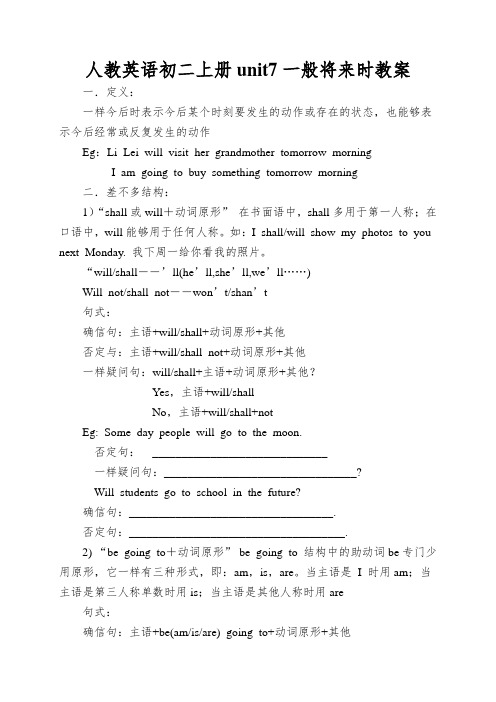
人教英语初二上册unit7一般将来时教案一.定义:一样今后时表示今后某个时刻要发生的动作或存在的状态,也能够表示今后经常或反复发生的动作Eg:Li Lei will visit her grandmother tomorrow morningI am going to buy something tomorrow morning二.差不多结构:1)“shall或will+动词原形”在书面语中,shall多用于第一人称;在口语中,will能够用于任何人称。
如:I shall/will show my photos to you next Monday. 我下周一给你看我的照片。
“will/shall――’ll(he’ll,she’ll,we’ll……)Will not/shall not――won’t/shan’t句式:确信句:主语+will/shall+动词原形+其他否定与:主语+will/shall not+动词原形+其他一样疑问句:will/shall+主语+动词原形+其他?Yes,主语+will/shallNo,主语+will/shall+notEg: Some day people will go to the moon.否定句:______________________________一样疑问句:_________________________________?Will students go to school in the future?确信句:___________________________________.否定句:_____________________________________.2) “be going to+动词原形”be going to 结构中的助动词be专门少用原形,它一样有三种形式,即:am,is,are。
当主语是I 时用am;当主语是第三人称单数时用is;当主语是其他人称时用are句式:确信句:主语+be(am/is/are) going to+动词原形+其他否定句:主语+be(am/is/are) not+going to +动词原形+其他。
人教版(新目标)英语八年级上unit7教案
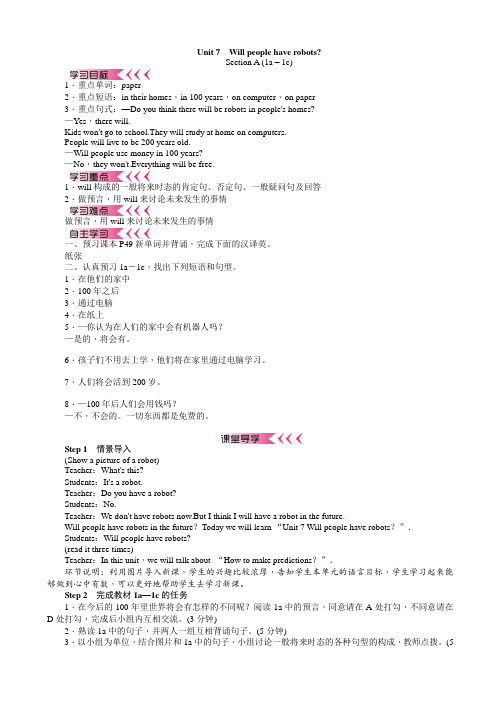
Unit 7Will people have robots?Section A (1a-1c)1.重点单词:paper2.重点短语:in their homes,in 100 years,on computer,on paper3.重点句式:—Do you think there will be robots in people's homes?—Yes,there will.Kids won't go to school.They will study at home on computers.People will live to be 200 years old.—Will people use money in 100 years?—No,they won't.Everything will be free.1.will构成的一般将来时态的肯定句、否定句、一般疑问句及回答2.做预言,用will来讨论未来发生的事情做预言,用will来讨论未来发生的事情一、预习课本P49新单词并背诵,完成下面的汉译英。
纸张____________二、认真预习1a-1c,找出下列短语和句型。
1.在他们的家中____________________2.100年之后____________________3.通过电脑____________________4.在纸上____________________5.—你认为在人们的家中会有机器人吗?—是的,将会有。
________________________________________________________________________6.孩子们不用去上学,他们将在家里通过电脑学习。
________________________________________________________________________7.人们将会活到200岁。
人教版新目标版八年级英语上册Unit 7 Will people have robots教案

《Unit 7 Will people have robots》教案Teaching goals:1.学习一般将来时态的相关知识,学会对未来进行预测.2.will 构成的一般将来时态的陈述句、否定句、疑问句及回答.3.There be 句型的一般将来时.4.more , less , fewer 的用法.5.Words&phrases: robot, paper, less, fewer, future, poll ution, play a part, on computers, etc . Important and difficult points :1.will构成一般将来时态的句式。
2.There be 句型的一般将来时态。
3.more , fewer , less 的用法。
Period 1Teaching procedures:Step 1 Leading in1.play an English song.2.Greetings:welcome to school.3.Let a student make a duty report.4.To set the scene increase Ss’vocabulary.Where are the two boys?They are talking about the future.Can you guess what will happen in ten years?Collect the Ss’ answers and say something about their predictions .Step 2 Pre-task1a .1.Look at the picture :How will the world be different in the future ,100 years from now ?We’re going to talk about sth in 100 years .2.Read each predictions to the class .Explain the new vocabulary .3.Read the instructions .Make sure Ss know what they should do .4.Do i t by themselves .5.Talk about the answers with the class .Explain :一般将来时态构成: will / be going to +动词原形Step 3 While-task1b .1.Practise reading the six predictions .2.Read the instructions to Ss .Circle the things you hear on the recording .3.Play the tape twice .4.Play the tape a third time .At the same time ,check the answers .1c .1.Pay attention to the dialogues .2.Read the dialogues fluently .3.Pairwork .Work in pairs to make predictions according to the sample .4.Ask several pairs to share their conversations to the class .2a & 2b .1.Read the predictions .2.Read the instructions and point out the sample answer .3.Play the tape twice .Ss circle the word they hear in each sentences: more , less , fewer .4.Check the answers .学生探究: less , fewer 的区别。
《八年级英语 Unit 7 Will people have robots》教学设计
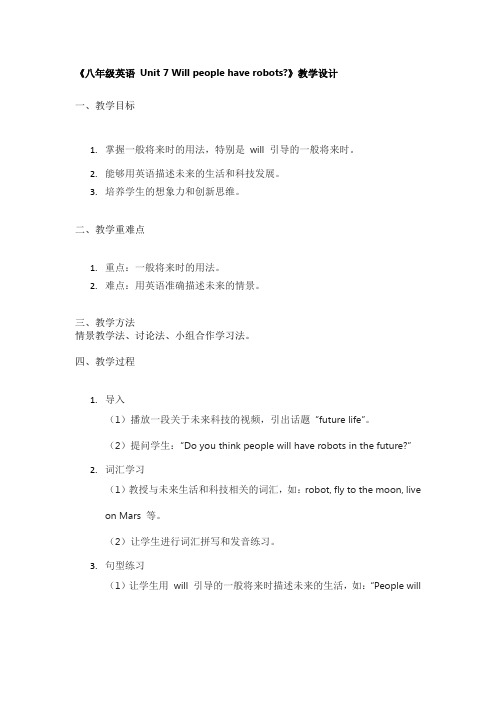
《八年级英语Unit7Will people have robots?》教学设计一、教学目标1.掌握一般将来时的用法,特别是will引导的一般将来时。
2.能够用英语描述未来的生活和科技发展。
3.培养学生的想象力和创新思维。
二、教学重难点1.重点:一般将来时的用法。
2.难点:用英语准确描述未来的情景。
三、教学方法情景教学法、讨论法、小组合作学习法。
四、教学过程1.导入(1)播放一段关于未来科技的视频,引出话题“future life”。
(2)提问学生:“Do you think people will have robots in the future?”2.词汇学习(1)教授与未来生活和科技相关的词汇,如:robot,fly to the moon,live on Mars等。
(2)让学生进行词汇拼写和发音练习。
3.句型练习(1)让学生用will引导的一般将来时描述未来的生活,如:“People willhave more free time.Robots will do most of the housework.”(2)小组活动,讨论未来的学校、家庭、交通等方面的变化。
4.听力训练(1)播放课本听力材料,让学生完成听力任务。
(2)检查答案,讲解重点内容。
5.阅读教学(1)学生阅读课本中的文章,了解未来的生活预测。
(2)提出问题,让学生回答,加深对文章的理解。
6.口语表达(1)让学生分组进行未来生活情景模拟,如未来的课堂、家庭聚会等。
(2)每组推选代表进行表演。
7.总结归纳(1)总结一般将来时的用法。
(2)引导学生对未来生活充满期待和积极的态度。
8.作业布置(1)完成课后练习。
(2)写一篇短文,描述自己心目中的未来生活。
人教版新目标英语八年级上册Unit 7 教案(单元全套)(精修版)
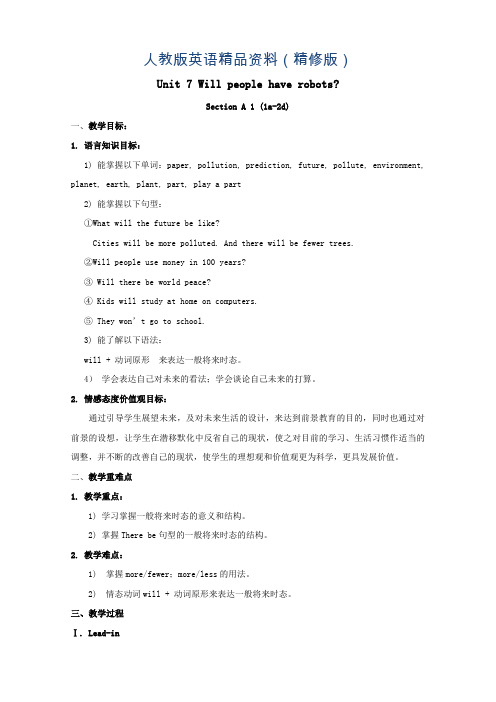
人教版英语精品资料(精修版)Unit 7 Will people have robots?Section A 1 (1a-2d)一、教学目标:1. 语言知识目标:1) 能掌握以下单词:paper, pollution, prediction, future, pollute, environment, planet, earth, plant, part, play a part2) 能掌握以下句型:①What will the future be like?Cities will be more polluted. And there will be fewer trees.②Will people use money in 100 years?③ Will there be world peace?④ Kids will study at home on computers.⑤ They won’t go to school.3) 能了解以下语法:will + 动词原形来表达一般将来时态。
4)学会表达自己对未来的看法;学会谈论自己未来的打算。
2. 情感态度价值观目标:通过引导学生展望未来,及对未来生活的设计,来达到前景教育的目的,同时也通过对前景的设想,让学生在潜移默化中反省自己的现状,使之对目前的学习、生活习惯作适当的调整,并不断的改善自己的现状,使学生的理想观和价值观更为科学,更具发展价值。
二、教学重难点1. 教学重点:1) 学习掌握一般将来时态的意义和结构。
2) 掌握There be句型的一般将来时态的结构。
2. 教学难点:1)掌握more/fewer;more/less的用法。
2)情态动词will + 动词原形来表达一般将来时态。
三、教学过程Ⅰ. Lead-in1. 在大屏幕上向学生展示一些机器人的图片,让学生们说出谈论自己的未来的工作,对工作的打算等:What do you want to be when you grow up?Ss: I want to be a scientist.T: How are you going to do that?Ss: I’m going to study science hard.….2. 学生们根据图片来引导出机器人这一话题。
人教版初二上册语法精讲名补教案Unit7一般将来时
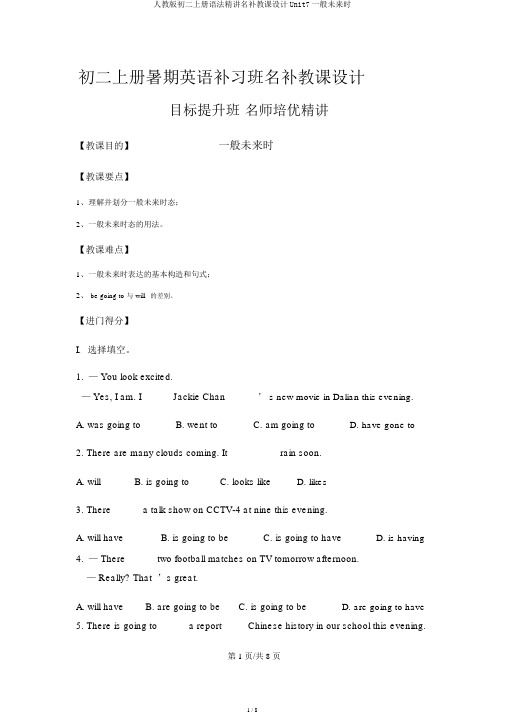
初二上册暑期英语补习班名补教课设计目标提升班名师培优精讲【教课目的】一般未来时【教课要点】1、理解并划分一般未来时态;2、一般未来时态的用法。
【教课难点】1、一般未来时表达的基本构造和句式;2、be going to与will的差别。
【进门得分】I.选择填空。
1.— You look excited.— Yes, I am. I _____ Jackie Chan ’ s new movie in Dalian this evening.A. was going toB. went toC. am going toD. have gone to2. There are many clouds coming. It _________ rain soon.A. willB. is going toC. looks likeD. likes3. There _____ a talk show on CCTV-4 at nine this evening.A. will haveB. is going to beC. is going to haveD. is having4.— There _____ two football matches on TV tomorrow afternoon.— Really? That ’s great.A. will haveB. are going to beC. is going to beD. are going to have5. There is going to _____ a report ____ Chinese history in our school this evening.A. have, onB. be, onC. have, forD. be, of【教课内容】一、基本观点表示未来某个要生的作或存在的状,常与一些表示未来的状用。
比如:I am going to / will watch a football match on TV this evening.今日夜晚我将在上看一足球比。
人教英语八年级上册unit 7一般将来时教案(word文档良心出品)
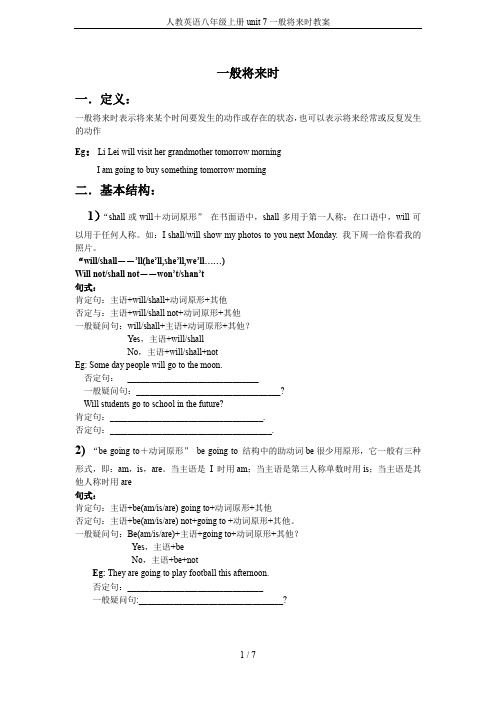
一般将来时一.定义:一般将来时表示将来某个时间要发生的动作或存在的状态,也可以表示将来经常或反复发生的动作Eg:Li Lei will visit her grandmother tomorrow morningI am going to buy something tomorrow morning二.基本结构:1)“shall或will+动词原形”在书面语中,shall多用于第一人称;在口语中,will可以用于任何人称。
如:I shall/will show my photos to you next Monday. 我下周一给你看我的照片。
“will/shall――’ll(he’ll,she’ll,we’ll……)Will not/shall not――won’t/shan’t句式:肯定句:主语+will/shall+动词原形+其他否定与:主语+will/shall not+动词原形+其他一般疑问句:will/shall+主语+动词原形+其他?Yes,主语+will/shallNo,主语+will/shall+notEg: Some day people will go to the moon.否定句:______________________________一般疑问句:_________________________________?Will students go to school in the future?肯定句:___________________________________.否定句:_____________________________________.2)“be going to+动词原形”be going to 结构中的助动词be很少用原形,它一般有三种形式,即:am,is,are。
当主语是I 时用am;当主语是第三人称单数时用is;当主语是其他人称时用are句式:肯定句:主语+be(am/is/are) going to+动词原形+其他否定句:主语+be(am/is/are) not+going to +动词原形+其他。
人教版八年级上册英语教案 Unit 7

spacestation,overandoveragain,beabletodosth.,wakeup,disagreewith,hundredsof,falldown,lookfor,atsomepoint,takeaholiday
重点句子
1.Somecanhelptobuildcars,andtheydosimplejobsoverandoveragain.
2.Fewerpeoplewilldosuchjobsinthefuturebecausetheyareboring,butrobotswillnevergetbored.
3.Scientistsarenowtryingtomakerobotslooklikehumansanddothesamethingsaswedo.
6.Ifbuildingsfalldownwithpeopleinside,thesesnakerobotscanhelplookforpeopleunderthebuildings.
7.Inthefuture,peoplewillworkmoresothey'llprobablyhavefewervacations,butIthinkI'lltakeaholidayinHongKongwhenpossible.
重点句子
1.Doyouthinktherewillberobotsinpeople'shomes?
2.Sowhatwillthefuturebelike?
3.Therewillbefewertreesandtheenvironmentwillbeingreatdanger.
4.Everyoneshouldplayapartinsavingtheearth.ievethatalthoughwecanmakerobotsmovelikepeople,itwillbedifficulttomakethemreallythinklikeahuman.
- 1、下载文档前请自行甄别文档内容的完整性,平台不提供额外的编辑、内容补充、找答案等附加服务。
- 2、"仅部分预览"的文档,不可在线预览部分如存在完整性等问题,可反馈申请退款(可完整预览的文档不适用该条件!)。
- 3、如文档侵犯您的权益,请联系客服反馈,我们会尽快为您处理(人工客服工作时间:9:00-18:30)。
一般将来时一.定义:一般将来时表示将来某个时间要发生的动作或存在的状态,也可以表示将来经常或反复发生的动作Eg:Li Lei will visit her grandmother tomorrow morningI am going to buy something tomorrow morning二.基本结构:1)“shall或will+动词原形”在书面语中,shall多用于第一人称;在口语中,will可以用于任何人称。
如:I shall/will show my photos to you next Monday. 我下周一给你看我的照片。
“will/shall――’ll(he’ll,she’ll,we’ll……)Will not/shall not――won’t/shan’t句式:肯定句:主语+will/shall+动词原形+其他否定与:主语+will/shall not+动词原形+其他一般疑问句:will/shall+主语+动词原形+其他?Yes,主语+will/shallNo,主语+will/shall+notEg: Some day people will go to the moon.否定句:______________________________一般疑问句:_________________________________?Will students go to school in the future?肯定句:___________________________________.否定句:_____________________________________.2)“be going to+动词原形”be going to 结构中的助动词be很少用原形,它一般有三种形式,即:am,is,are。
当主语是I 时用am;当主语是第三人称单数时用is;当主语是其他人称时用are句式:肯定句:主语+be(am/is/are) going to+动词原形+其他否定句:主语+be(am/is/are) not+going to +动词原形+其他。
一般疑问句:Be(am/is/are)+主语+going to+动词原形+其他?Yes,主语+beNo,主语+be+notEg: They are going to play football this afternoon.否定句:_______________________________一般疑问句:_________________________________?辨析一、在表示将来发生的事情时,二者的区别主要是:1、be going to 用于主观判断,及说话人主观上计划或安排将要去做的事情.will则多用于客观的情况,即客观上将要发生的事情.例如:I’m not going to ask her. 我不打算去问她.It will be rainy tomorrow.明天会下雨.2、be going to 表示近期、眼下就要发生的事情,will 表示的将来时间则较远一些.例如:He’s going to do it right away. 他马上就去做.Will she arrive on time next time? 下次她会按时到吗?二、可表示说话人按照他的意图将要发生或进行的动作时,各有侧重:若表示没有经过事先计划或考虑,而是在说话的当时临时想到的意图或临时作出的决定时,则要用will.若表示经过事先考虑好的意图时,要用be going to.例如:I’ll answer the telephone.我去接电话.(事先没经过考虑)I’m going to meet him at the railway station. 我去火车站接他.(已经过考虑)三、在有条件从句的主句中一般不用be going to, 而多用will,因为此时多少带有些意愿.例如:I won’t go if he doesn’t come.他不来,我就不去.三.标志词:表示将来的时间状语next+ day/week/month/year/morning…..tomorrow, tomorrow morning/night, the day after tommorrowin +一段时间(a few minutes/five days/a month)from now onthe coming Sunday/month/weekin the futurethis afternoon.soon四.There be 句型的一般将来时1)用法:There be句型的一般将来时表示将来某地会有某人或物2)构成:肯定句:there will be+n+其他或there is/are going to be+n+其他Be 不能改为haveThere will be a football match tomorrow.There is going to be a meeting tonight.否定句:there will not be+n+其他或者there is/are not going to be+n+其他_____________________________________________.________________________________________________.一般疑问句:will there be+n+其他?或者is/are there going to be +n+其他?____________________________________________?_____________________________________________?五.现在进行时表将来在表示位移的动词(go, leave, arrive, meet, move, return, start, fly, begin)中,用现在进行时表示来。
Eg:The train is comingThe bus is arriving at 9:00Mr. Wu is coming tonight.He is meeting the manager tomorrow.【模拟试题】(答题时间:45分钟)一.用所给词的适当形式填空。
1. She ________ flowers in my garden tomorrow morning. (water)2. I will stay at home if it _________ tomorrow. (rain)3. What are you ________ to do tomorrow? (go)4. The radio says it ________ rainy tomorrow. (be)5. She says she _________ me a beautiful dress tomorrow morning. (buy)二.句型转换。
6. Li Ming will play with a toy car. (转换为一般疑问句)_____Li Ming _____ with a toy car?7. They’ll go for a walk after supper.(转换为否定句)They _____ _____ for a walk after supper.8. Will the flowers come out next week? (作否定回答)_____, _____ _____.9. I will have an English exam tomorrow. (转换为同义句)I _____ _____ _____ have an English exam tomorrow.10. The boys have a basketball l match on Saturday. (用next Saturday y来改写)The boys _____ _____ _____ _____ a basketball match next Saturday.三、单项选择。
1. There __________ a meeting tomorrow afternoon.A. will be going toB. will going to beC. is going to beD. will go to be2. Charlie ________ here next month.A. isn’t workingB. doesn’t workingC. is n’t going to workingD. won’t work3. He ________ very busy this week, he ________ free next week.A. will be; isB. is; isC. will be; will beD. is; will be4. There ________ a dolphin show in the zoo tomorrow evening.A. wasB. is going to haveC. will haveD. is going to be5. –________ you ________ free tomorrow?–No. I ________ free the day after tomorrow.A. Are; going to; willB. Are; going to be; willC. Are; going to; will beD. Are; going to be; will be6. Mother ________ me a nice present on my next birthday.A. will givesB. will giveC. givesD. give7. – Shall I buy a cup of tea for you?–________.(不,不要。
)A. No, you won’t.B. No, you aren’t.C. No, please don’t.D. No, please.8. – Where is the morning paper?– I ________ if for you at once.A. getB. am gettingC. to getD. will get9. ________ a concert next Saturday?A. There will beB. Will there beC. There can beD. There are10. If they come, we ________ a meeting.A. haveB. will haveC. hadD. would have11. He ________ her a beautiful hat on her next birthday.A. givesB. gaveC. will givingD. is going to give12. He ________ to us as soon as he gets there.A. writesB. has writtenC. will writeD. wrote13. He ________ in three days.A. coming backB. came backC. will come backD. is going to coming back14. If it ________ tomorrow, we’ll go roller-skating.A. isn’t rainB. won’t rainC. doesn’t rainD. doesn’t fine15. – Will his parents go to see the Terra Cotta Warriors tomorrow?– No, ________(不去).A. they willnot.B. they won’t.C. they aren’t.D. they don’t.16. Who ________ we ________ swimming with tomorrow afternoon?A. will; goB. do; goC. will; goingD. shall; go17. We ________ the work this way next time.A. doB. will doC. going to doD. will doing18. Tomorrow he ________ a kite in the open air first, and then ________ boating in the park.A. will fly; will goB. will fly; goesC. is going to fly; will goesD. flies; will go19. The day after tomorrow they ________ a volleyball match.A. will watchingB. watchesC. is watchingD. are going to watch20. There ________ a birthday party this Sunday.A. shall beB. will beC. shall going to beD. will going to be21. They ________ an English evening next Sunday.A. are havingB. are going to haveC. will havingD. is going to have22. ________ you ________ free next Sunday?A. Will; areB. Will; beC. Do; beD. Are; be23. He ________ there at ten tomorrow morning.A. willB. isC. will beD. be24. ________ your brother ________ a magazine from the library?A. Are; going to borrowB. Is; going to borrowC. Will; borrowsD. Are; going to borrows25. – Shall I come again tomorrow afternoon?–________(好的).A. Yes, pleaseB. Yes, you will.C. No, please.D. No, you won’t.26. It ________ the year of the horse next year.A. is going to beB. is going toC. will beD. will is27. ________ open the window?A. Will you pleaseB. Please will youC. You pleaseD. Do you28. –Let’s go out to play football, shall we?– OK. I ________.A. will comingB. be going to comeC. comeD. am coming29. It ________ us a long time to learn English well.A. takesB. will takeC. spendsD. will spend30. The train ________ at 11.A. going to arriveB. will be arriveC. is going toD. is arriving四、动词填空。
